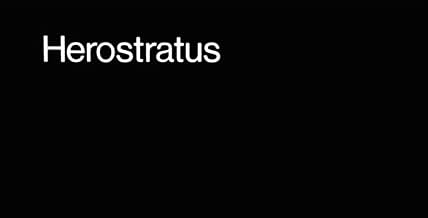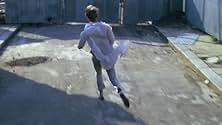When young poet Max (Michael Gothard) hires a marketing company to turn his suicide-by-jumping into a mass-media spectacle, he finds that his subversive intentions are quickly diluted into a... Read allWhen young poet Max (Michael Gothard) hires a marketing company to turn his suicide-by-jumping into a mass-media spectacle, he finds that his subversive intentions are quickly diluted into a reactionary gesture, and his motivations are revealed as a desperate attempt to seek atte... Read allWhen young poet Max (Michael Gothard) hires a marketing company to turn his suicide-by-jumping into a mass-media spectacle, he finds that his subversive intentions are quickly diluted into a reactionary gesture, and his motivations are revealed as a desperate attempt to seek attention through celebrity.
- Director
- Writers
- All cast & crew
- Production, box office & more at IMDbPro
Featured reviews
Interesting forgotten artifact of British cinema
Max (Michael Gothard), is a struggling poet. He is agonised by society around him, and like Travis Bickle in the later film Taxi Driver (1976), he foments a distinctive hatred whilst holding up alone in a disheveled flat in a distorted, crumbling London. But unlike Bickle, Max's ideas are motivated by fame. He proposes to a marketing executive, Farson (Peter Stephens), an offer he cannot refuse. Max will publicly kill himself by jumping off of a tall building, and the advertising company can own this commodity, and do whatever they please with it. The machinations of the marketeers begins, as they attempt to come up with adequate exposure for the death-as-entertainment, subversive performance art piece. The silence that preceded Max's encounter with Farson, is perfectly highlighted in a line from Albert Camus, in his book 'The Myth of Sisyphus': An act like this (suicide) is prepared within the silence of the heart, as is a great work of art. As the workings of the sadistic minds of advertisers is quietly taking place in the background, Max begins a relationship of sorts with Farson's secretary, Clio (Gabriella Licudi), with devastating consequences.
As a commodity, Max is used, humiliated, and displayed as despicable for his desperate attempt at using his death for fame and immortality. The title of the film is taken from a character from ancient Greece who wanted immortality; which he gained by setting fire to the Temple of Artemis. The film is most certainly relevant today with our wealth of deluded people, hungry for fame with no substance. Fame has itself become a commodity: We are in an age of fame that is hinged on one act; one single moment. And like the fame that Max is attempting to gain, it is also very fleeting.
The films technical brilliance is in its editing, a process that took Levy two years to perfect. Levy approached editing like science (he did have a PhD in Experimental Physics). The film is littered with subliminal images. Short sequences of static shots, obscure imagery, and images of animal slaughter. The latter of these are often used to juxtapose with images of a female stripper. The snippets also seem to appear, not just as fractured images of a deranged mind, but also almost synonymous with televisual adverts themselves. Almost self contained. In one, a very young Helen Mirren (uber-MILF) seduces the camera and its audiences, stating that you want her. The use of jump-cuts and long takes is reminiscent of the then new European movements, mostly evoking some of the work of Godard and Antonioni.
It's an interesting piece of forgotten cinema. As with many art-house films of this type, it is highly pretentious. But it is watchable pretension. It's idea does not really carry throughout the film, and it could have gone in more interesting angles. But this could perhaps be just an opinion from today's perspective: Marketing has certainly become more all-pervasive since the late 1960's. As a closing statement, it is ironic that later, both Don Levy and Michael Gothard ended their lives by suicide. The film remains though, and is at times visually arresting. Classic? No. But as an artifact of British '60's cinema, it is a delight.
www.the-wrath-of-blog.blogspot.com
You'll never see a film like it
Written and directed by Don Levy, it was the only full-length film he ever made and it is a long (142 minutes) and slow work distinguished by its innovativeness and opacity. The narrative is pretty minimal and therefore can be briefly stated: a very angry young man called Max (Michael Gothard) decides he has had enough of life and offers an advertising company the opportunity to exploit his public suicide. This explains the erudite title: Herostratus was an Ancient Greek arsonist who destroyed the Temple of Artemis, one of the Seven Wonders of the Ancient World, and his name has become a metonym for someone who commits a criminal act in order to become famous.
The film looks and sounds amateurish and indeed had a tiny budget (but took six years from conception to completion). However, clearly Levy wanted some of the dialogue to be hard to hear and some of the scenes to be difficult to watch. One of the most startling and memorable sequences inter cuts the dancing of a sexy woman with the butchering of a dead animal and one of the most inexplicable (but again memorable) images is of a parasol-carrying woman clad in black with a white face. This is a work full of odd interjections ranging from the voice of the elderly Malcom Muggeridge to a near-wordless burlesque by a very young Helen Mirren in her first film role. There are extracts from semi-contemporary newsreels scattered about the film which seem to be inviting us to question what kind of world we have created.
Seeing "Herostratus" after such a long interval and at the more mature age of 66, I found that I was less tolerant of the pretentiousness of the whole thing but still captivated by the bewildering images. Also I was disturbed to read after the viewing that both the director and the lead actor subsequently committed suicide.
Sadly, dated
an extraordinary,disturbing and haunting movie
Visually bold British experimental work, back from oblivion
This British underground film was unseen for close to forty years before it was resurrected by the BFI. It is a very odd film indeed, pretty much fully an avant-garde piece. The story-line is essentially quite basic and not a huge amount of plot really happens, which for a 142min film is unusual. For me, by far the most interesting thing about this one was its visual ideas. It's a film which is relentlessly experimental in approach with elements of surrealism. The memorable visuals are often achieved by way of very bold editing techniques used throughout, where contrasting images are juxtaposed with each other. There is recurring imagery used extensively, including a mysterious black clad woman wandering the backstreets of London, an exotic dancer interspersed with images from a slaughterhouse, old newsreels and many billboard advertisements. There is a hell of a lot more than this as well but this is a film which throws a lot at you and it can be hard recalling precisely everything that occurs. There is a mixture between very long single takes and fast edits, the former are used for dramatic intensity. Michael Gothard is the lead here and he is an actor associated with intense performances, so he is a good fit it has to be said. The film overall is certainly a fascinating watch but it is slow in places and there are patches where it does get a bit tedious. The narrative was semi-interesting but the visual invention is really what it's worth seeing for and it is for sure a film that should be seen by those drawn towards experimental cinema. Look out too for an appearance of a very young Helen Mirren.
Did you know
- TriviaHelen Mirren's debut.
- ConnectionsEdited from Nazi Concentration and Prison Camps (1945)
- How long is Herostratus?Powered by Alexa
Details
- Runtime
- 2h 22m(142 min)
- Color
- Sound mix


























